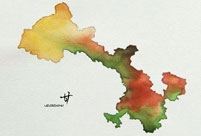 The Western Qing Mausoleum
The Western Qing Mausoleum
 Avant-garde approach to graduation photos
Avant-garde approach to graduation photos
 Early PLA posters, signatures of an era
Early PLA posters, signatures of an era
 First Russian Street in Tianjin open to public
First Russian Street in Tianjin open to public
 Motorcycle stunt on the Bund
Motorcycle stunt on the Bund
 French Spiderman Alain Robert climbs up Galaxy Hotel in Macao
French Spiderman Alain Robert climbs up Galaxy Hotel in Macao
 Africans in Guangzhou
Africans in Guangzhou
 Pole dancer shows strength and beauty up in the air
Pole dancer shows strength and beauty up in the air
 Top 10 celebrities driving auto brands
Top 10 celebrities driving auto brands
 10 low-carbon tips to save money
10 low-carbon tips to save money
BEIJING, May 4 -- Netizens in China have applauded a letter signed by 11 Uygur university students and graduates condemning the deadly terror attack at Urumqi south railway station.
In the letter, published online, the students spoke of their grief, their anger and their resolution to denounce terrorism.
"Silence is a kind of acquiescence with the terrorists," said Merdan Weli, a Xinjiang University postgraduate who raised the idea of the letter among his Uygur friends.
Merdan was at a restaurant on Wednesday two blocks away from the train station when knife-wielding men began slashing at people and setting off explosives. Three people died and dozens were left injured.
Merdan said terrorists were damaging the reputation of the Xinjiang people. "We had to do something," he said
Merdan discussed contents of the letter with friends in a WeChat group, a mobile instant messaging service run by Tencent.
Kurbanjan Weli, a North China University of Water Resources and Electric Power graduate now teaching Chinese in Urumqi, was the chief writer of the letter.
In the letter, Kurbanjan posed 11 questions to the terrorists.
"Murderers, what do you want? You said you want respect and rights, but can't you see the mosque beside the bombing site? It is a place for serenity and peace. Have you got the slightest faith in religion? You tried to kill innocent people, regardless male or female, young or old -- why the hatred towards them?"
The letter continued, "What have you got? Ending others' lives and getting a pair of bloody hands? It's a sin!"
The end of the letter said, "Our enemies want to break our unity and solidarity because they are afraid of our unity. No more silence, let's stand together and crush them."
Many Internet users, some of whom have been debating whether it is still safe to travel and do business in Xinjiang, have changed their perceptions after reading the letter.
"The letter reflects the true voice of the Uygur people, most of whom are kind and generous like the rest of us. A small handful of evil doers do not represent the general good," Beijing local Dong Jianbin wrote on Sina Weibo, China's Twitter.
Ma Dazheng, a researcher with the Research Center for Chinese Borderland History and Geography under the Chinese Academy of Social Sciences, said it was rare for young people from Xinjiang to express what they felt about terrorism.
"They are realizing that a widening rift between the Xinjiang people and other regions needs to be contained, because a harmonious relationship between different ethnic groups is in the interests of the Uygur people," said Ma.
The researcher said it was essential for China to draw on the strength of the people to win the fight against terrorism, especially with the support of the Uygur people.
While urging a strong hand to strike down on the terrorists during an inspection tour to Xinjiang, Chinese President Xi Jinping stressed that people of all ethnic groups in Xinjiang are "our brothers and sisters," and religious extremists and terrorists are "our common enemies".
"We should bring our true hearts to our brothers and sisters while striking our common enemies with sharp and relentless efforts," Xi said.
In a commentary published on haiwainet.com, political commentator Liu Xuesong called for mutual understanding between the Uygur people and other ethnic groups.
"By standing out and speaking out, the 11 students are performing a duty to safeguard ethnic solidarity, and we need to support them," said Liu.
 The Western Qing Mausoleum
The Western Qing Mausoleum Overseas returnees strive for dreams in Beijing
Overseas returnees strive for dreams in Beijing Fried up: Chili pork bonanza in Central China
Fried up: Chili pork bonanza in Central China Hand-painted maps go viral online
Hand-painted maps go viral online 4th Beijing Int'l Film Festival ends
4th Beijing Int'l Film Festival ends Commando elite specializes in sign language
Commando elite specializes in sign language Man photoshops himself into girlfriend's childhood photos
Man photoshops himself into girlfriend's childhood photos Photo story: Stallholders at Beijing Zoo Wholesale Market
Photo story: Stallholders at Beijing Zoo Wholesale Market Artists on backstage
Artists on backstage 'African Street' in Guangzhou
'African Street' in Guangzhou Special operation members in comprehensive training
Special operation members in comprehensive training Cute Shaolin boy melts the hearts of millions
Cute Shaolin boy melts the hearts of millions Giant panda Sijia is back to happy life
Giant panda Sijia is back to happy life Richest Chinese of 2014: half from the mainland
Richest Chinese of 2014: half from the mainland Chengdu - laid-back lifestyle makes happiest city
Chengdu - laid-back lifestyle makes happiest cityDay|Week|Month